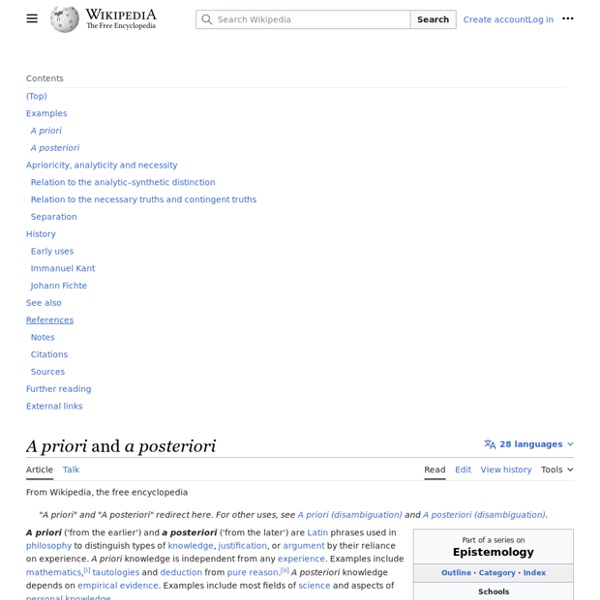Anthropomorphism
When you talk to your dog, your computer, your teddy bear, or your car as if you were speaking to another person, you are anthropomorphizing—or attributing human characteristics like emotions and intent to a non-human entity. Anthropomorphism is a universal mental process—pretty much everyone does it—but research shows that the degree to which individuals anthropomorphize can have significant consequences in their lives. Ascribing human qualities to inanimate objects is generally associated with innocuous, often positive effects like "cuteness," humor, empowerment, and a mature sense of responsibility. Anthropomorphism as it relates to nature, for example, can lead to better environmental conservation, and an anthropomorphic attitude towards money can lead to more financial stability.
plato.stanford
1. Examples that illustrate the difference between a priori and a posteriori (empirical) justification A priori justification is a certain kind of justification often contrasted with empirical, or a posteriori, justification.
index
1. Moral Philosophy and its Subject Matter Hume and Kant operate with two somewhat different conceptions of morality itself, which helps explain some of the differences between their respective approaches to moral philosophy. The most important difference is that Kant sees law, duty, and obligation as the very heart of morality, while Hume does not. In this respect, Kant’s conception of morality resembles what Bernard Williams calls “the moral system”, which defines the domain of morality primarily in terms of an unconditionally binding and inescapable form of obligation (Williams 1985: 193–94). Kant believes that our moral concerns are dominated by the question of what duties are imposed on us by a law that commands with a uniquely moral necessity.
Anthropomorphism
Personification is the related attribution of human form and characteristics to abstract concepts such as nations, emotions, and natural forces, such as seasons and weather. Both have ancient roots as storytelling and artistic devices, and most cultures have traditional fables with anthropomorphized animals as characters. People have also routinely attributed human emotions and behavioural traits to wild as well as domesticated animals.[3] Etymology Anthropomorphism derives from its verb form anthropomorphize,[a] itself derived from the Greek ánthrōpos (ἄνθρωπος, lit. "human") and morphē (μορφή, "form").
www.britannica
A priori knowledge, in Western philosophy since the time of Immanuel Kant, knowledge that is acquired independently of any particular experience, as opposed to a posteriori knowledge, which is derived from experience. The Latin phrases a priori (“from what is before”) and a posteriori (“from what is after”) were used in philosophy originally to distinguish between arguments from causes and arguments from effects. The first recorded occurrence of the phrases is in the writings of the 14th-century logician Albert of Saxony.
academic.oup
We use cookies to enhance your experience on our website. By clicking 'continue' or by continuing to use our website, you are agreeing to our use of cookies. You can change your cookie settings at any time. We use cookies to enhance your experience on our website.By continuing to use our website, you are agreeing to our use of cookies. You can change your cookie settings at any time. <a href=" Find out more</a>
Imagination
Imagination is the capacity to produce images, ideas and sensations in the mind without any immediate input of the senses (such as seeing or hearing). Imagination helps make knowledge applicable in solving problems and is fundamental to integrating experience and the learning process.[1][2][3][4] A basic training for imagination is listening to storytelling (narrative),[1][5] in which the exactness of the chosen words is the fundamental factor to "evoke worlds".[6] Imagination is a cognitive process used in mental functioning and sometimes used in conjunction with psychological imagery. The cognate term of mental imagery may be used in psychology for denoting the process of reviving in the mind recollections of objects formerly given in sense perception. Imagination can also be expressed through stories such as fairy tales or fantasies.
www.britannica
Since at least the 17th century, a sharp distinction has been drawn between a priori knowledge and a posteriori knowledge. The distinction plays an especially important role in the work of David Hume (1711–76) and Immanuel Kant (1724–1804). Read More on This Topic John Locke: Knowledge In Book IV of the Essay, Locke reaches the putative heart of his inquiry, the nature and extent of human knowledge. His precise definition…
plato.stanford
1. A Sketch of Kant's View of the Mind In this article, we will focus on Immanuel Kant's (1724–1804) work on the mind and consciousness of self and related issues. Some commentators believe that Kant's views on the mind are dependent on his idealism (he called it transcendental idealism).



